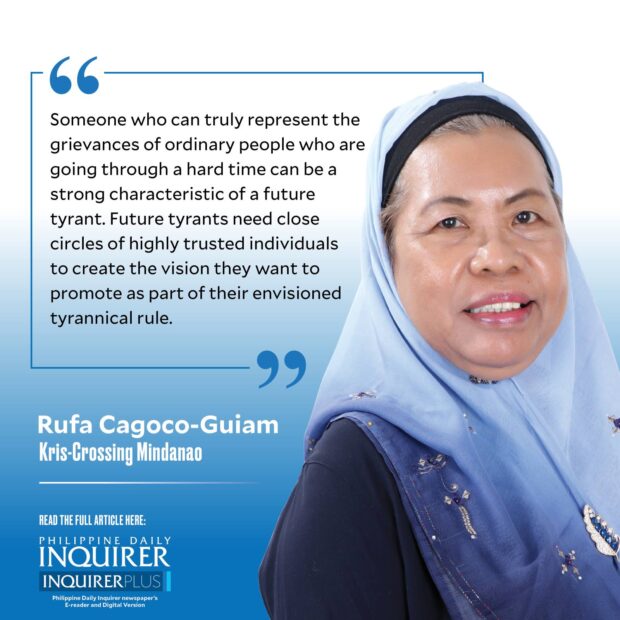Can tyranny be prevented?
Over the weekend, my main respite from all the work I do, both professionally and domestically, is watching films on Netflix and other streaming platforms—and I discovered “How to become a tyrant.”
I remember from my student days (those were the dark years of martial law), my classmates and I often heard this from our older colleagues in the local student movement. “There are no tyrants where there are no slaves.” At that time, my then immature political thinking made me believe that this is a simple imbalanced relationship—without understanding the myriad contexts where such a relationship develops. I just thought that people should not allow themselves to be enslaved so those who have the desire to oppress them will not become tyrants.
Watching the series on how tyrants become who they are, using documented reports from various examples of tyrants in different contexts, the evolution of tyrants and those they “enslaved” is not that simple. There are many things and factors that together work in tandem with each other to provide the petri dish that nurtures the evolution of a simple individual into a future tyrant. This was sharply portrayed in the case of Adolf Hitler, who used to be an ordinary soldier in the trenches in World War I—a penniless war veteran and a “failed and friendless landscape artist.”
In the documentary series, would-be tyrants follow a “playbook,” or in the language of development consultants, the manual of operations, or a handbook of how to manage an organization. “There is a playbook for tyrants,” says Bruce Bueno de Mesquita, professor of political science at New York University. The narrator adds that “history’s successful tyrants … transform their societies from top to bottom.”
The playbook for tyrants requires that anyone who wants to trek the path of gaining absolute power first have to believe that they can rule, and only they can fix the problems that their compatriots face at a certain time. Then they have to create or reveal some “otherworldly” or even divine messages they received to justify their seizure of power, at the right time and with the right conditions. It also entails the skills of modern-day public relations advertising, using symbols and icons that favorably portray future tyrants as “one of the people,” who feel what the ordinary people feel, and who dream what they dream, too.
Someone who can truly represent the grievances of ordinary people who are going through a hard time can be a strong characteristic of a future tyrant. Future tyrants need close circles of highly trusted individuals to create the vision they want to promote as part of their envisioned tyrannical rule. This circle or team must have members who are loyal to the future tyrant at all times, and who put their leader on top priority, even to the detriment of their own family, similar to the likes of Hitler’s Joseph Goebbels.
All the examples in the series so far (I have not finished all the episodes) strangely remind me of similar incidents prior to the declaration of martial law on Sept. 21, 1972. Contrived violent incidents, ambushes of people within your loyal circle, and a hyperbolic description of conflicts that were triggered by groups like the New Peoples’ Army in the north, and the Moro National Liberation Front in Mindanao were among the scenarios that then President Ferdinand E. Marcos Sr. used to justify martial law declaration.
Successful tyrants included in the series have shown they were able to sustain their grip on absolute power because of the secret support of a group of soldiers or police elements composed of both rogue and mercenaries willing to kill at the behest of their tyrannical master. In the case of Joseph Stalin, it was a secret police group that was known to have killed millions whom Stalin considered “enemies of the people.” In Idi Amin’s Uganda, it was a group called a Secret Research Bureau, while Haiti’s “Papa Doc” Duvalier had his “Tonton Macoute” or “Bogeyman” group.
Tyrants may have their “glorious days” but then, nothing lasts forever. Something radical can happen, like an international intervention as shown in the Marcoses being hauled off to Hawaii in 1986 as a consequence of the first Edsa revolt in February 1986. In the case of Idi Amin of Uganda, his tyrannical rule ended when he was defeated by Tanzanian troops.
Unfortunately, this does not mean that there will be no tyrants in the future. And we can learn lessons from the documentary to help us prevent this from happening.
But more importantly, I think we should come up with a playbook of our own—on how to prevent our leaders from becoming tyrants and to counter anything that will create an enabling environment for tyrants to thrive.
—————-
Comments to rcguiam@gmail.com






















